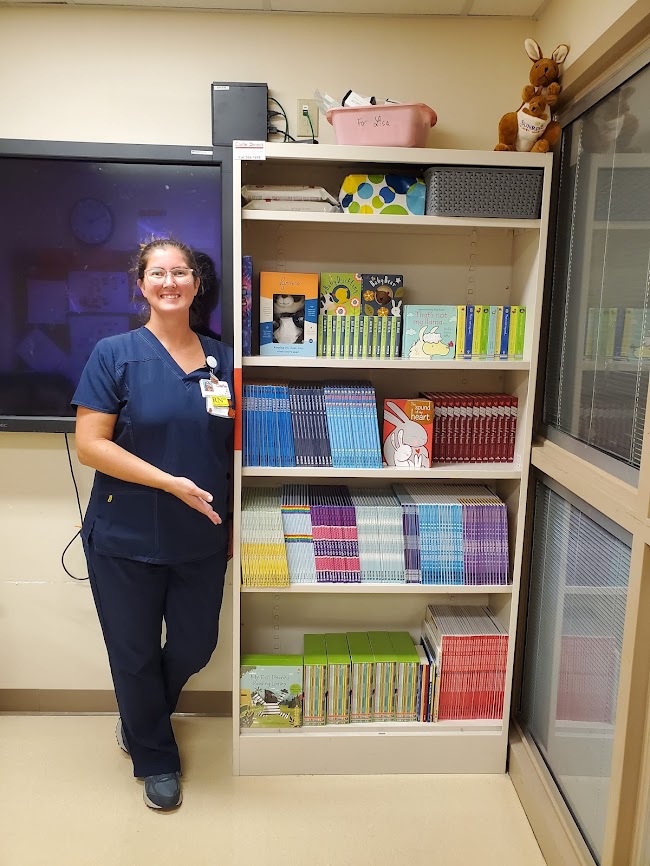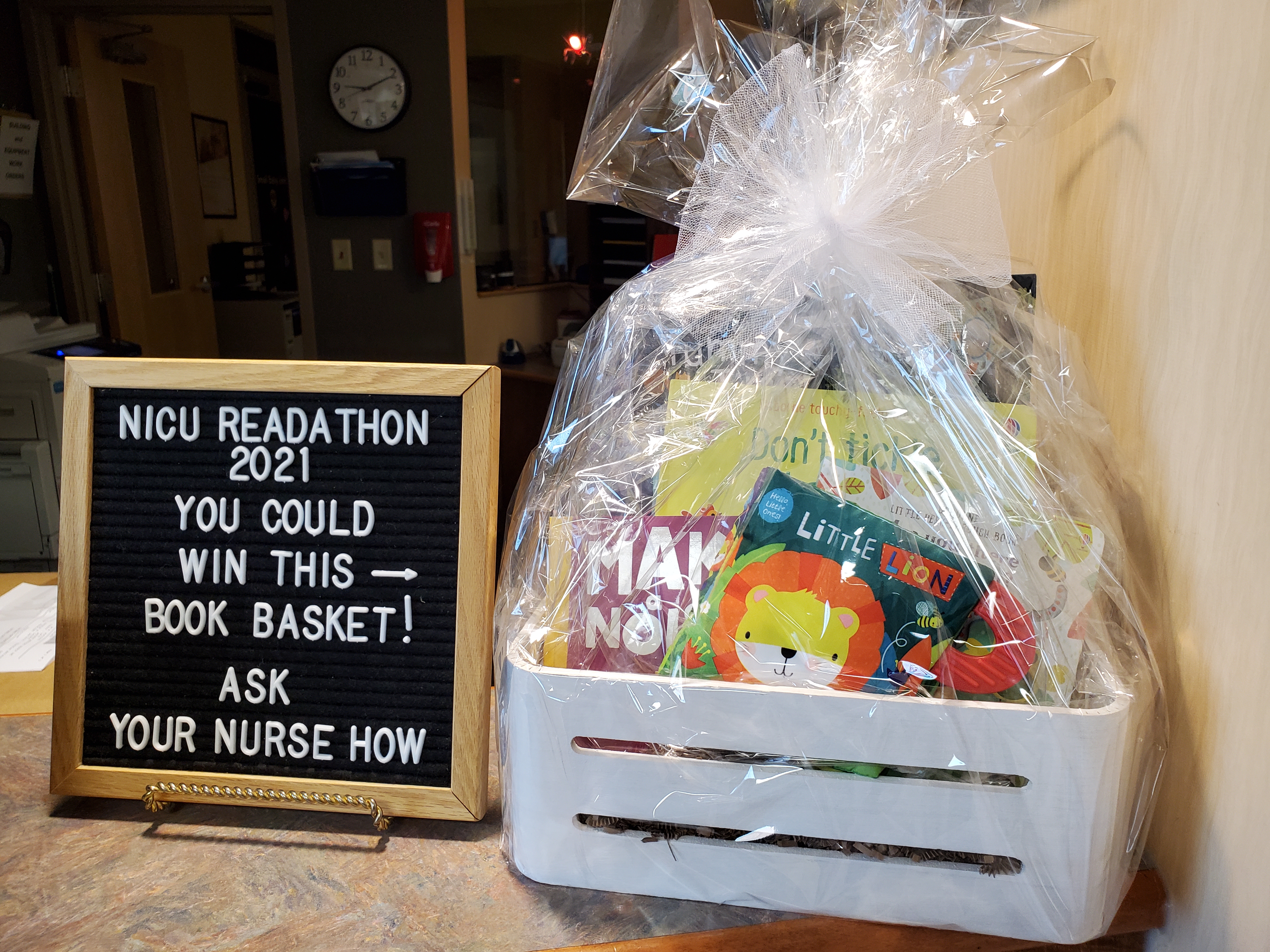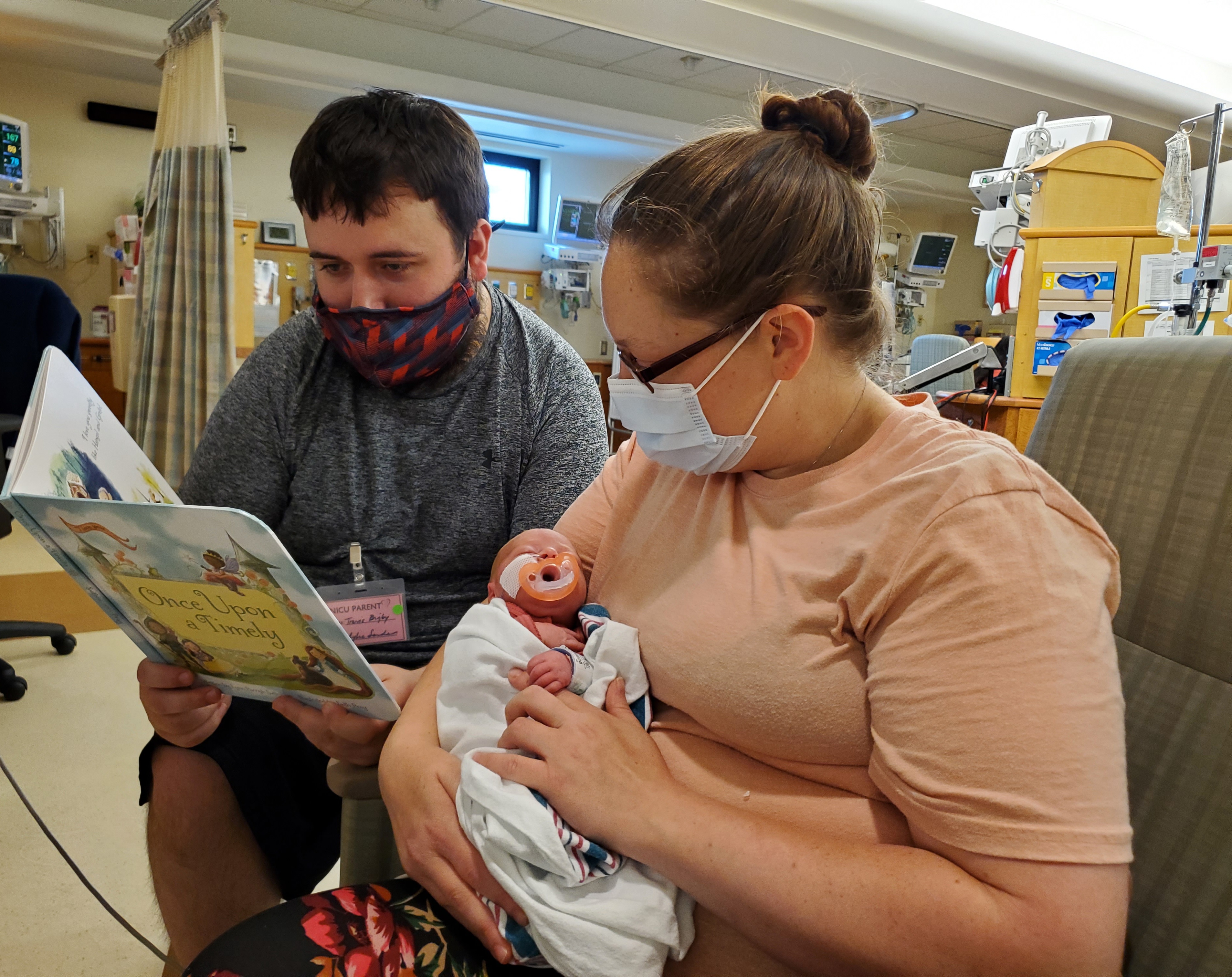Babies in the Neonatal Intensive Care Unit (NICU) at Carle Foundation Hospital receive special treatment each day, but later this month one of them will also go home with a basket full of books to enjoy thanks to a friendly reading competition through the annual Babies-With-Books NICU Read-A-Thon.
 NICU’s Liz Kelm, RN, spearheaded an effort to collect 300 new books for families and staff to use in the event, Sept. 13 through Sept. 23. Each baby admitted to the NICU receives a book followed by another book at the start of the NICU Read-A-Thon.
NICU’s Liz Kelm, RN, spearheaded an effort to collect 300 new books for families and staff to use in the event, Sept. 13 through Sept. 23. Each baby admitted to the NICU receives a book followed by another book at the start of the NICU Read-A-Thon.
“I’ve always had an interest in reading and reading to children. My mother made sure we read together often,” Kelm said. “We hope to turn this into a program that celebrates reading all of the time in the NICU.”
During the week, reading sessions Carle team members or family members track their reading time through a book ticket that then goes into a raffle. The unit will display book tickets near the entrance of the NICU to create a “library” of sorts. There are about 25 or more babies in the NICU at Carle Foundation Hospital on any given day and the goal is to have each baby read to at least once a day. A random drawing from the book tickets will determine which baby goes home with a basket of books.
Carle Foundation Hospital is one of more than 100 hospitals registered in the international competition for bragging rights and to offer more enrichment to infants who need it most.
NICU babies are often at risk of delays in neurodevelopment. Parents and staff may not even be able to hold the most critical patients. Reading gives parents an opportunity to bond with their child as well as support their baby’s growth and development. Studies show babies respond to their parent’s voice and emotions more than anyone else and when they hear words and language, they form brain connections that support their learning throughout their life.
 Carle NICU team members will also share information with parents about the importance of reading to their babies as well as how to read in a way that supports but not overstimulates the baby. For example, books with rhyming stories are good choices as rhymes train the brain to learn the smallest parts of words, building blocks for later language development.
Carle NICU team members will also share information with parents about the importance of reading to their babies as well as how to read in a way that supports but not overstimulates the baby. For example, books with rhyming stories are good choices as rhymes train the brain to learn the smallest parts of words, building blocks for later language development.
The American Acaemy of Pediatrics recommends 15 to 20 minutes of daily reading for all babies and children from birth.
 NICU’s Liz Kelm, RN, spearheaded an effort to collect 300 new books for families and staff to use in the event, Sept. 13 through Sept. 23. Each baby admitted to the NICU receives a book followed by another book at the start of the NICU Read-A-Thon.
NICU’s Liz Kelm, RN, spearheaded an effort to collect 300 new books for families and staff to use in the event, Sept. 13 through Sept. 23. Each baby admitted to the NICU receives a book followed by another book at the start of the NICU Read-A-Thon.“I’ve always had an interest in reading and reading to children. My mother made sure we read together often,” Kelm said. “We hope to turn this into a program that celebrates reading all of the time in the NICU.”
During the week, reading sessions Carle team members or family members track their reading time through a book ticket that then goes into a raffle. The unit will display book tickets near the entrance of the NICU to create a “library” of sorts. There are about 25 or more babies in the NICU at Carle Foundation Hospital on any given day and the goal is to have each baby read to at least once a day. A random drawing from the book tickets will determine which baby goes home with a basket of books.
Carle Foundation Hospital is one of more than 100 hospitals registered in the international competition for bragging rights and to offer more enrichment to infants who need it most.
NICU babies are often at risk of delays in neurodevelopment. Parents and staff may not even be able to hold the most critical patients. Reading gives parents an opportunity to bond with their child as well as support their baby’s growth and development. Studies show babies respond to their parent’s voice and emotions more than anyone else and when they hear words and language, they form brain connections that support their learning throughout their life.
 Carle NICU team members will also share information with parents about the importance of reading to their babies as well as how to read in a way that supports but not overstimulates the baby. For example, books with rhyming stories are good choices as rhymes train the brain to learn the smallest parts of words, building blocks for later language development.
Carle NICU team members will also share information with parents about the importance of reading to their babies as well as how to read in a way that supports but not overstimulates the baby. For example, books with rhyming stories are good choices as rhymes train the brain to learn the smallest parts of words, building blocks for later language development.The American Acaemy of Pediatrics recommends 15 to 20 minutes of daily reading for all babies and children from birth.
Categories: Culture of Quality, Staying Healthy, Community
Tags: babies, Champaign-Urbana, NICU, reading
